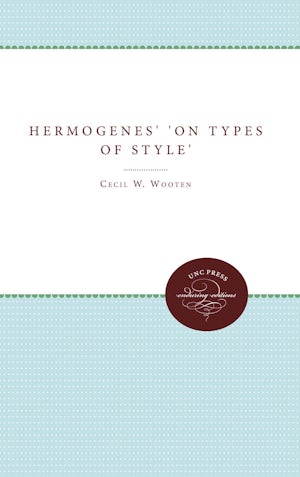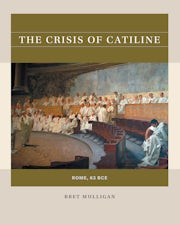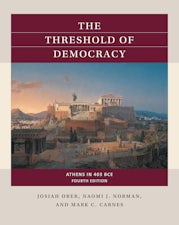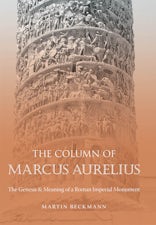Hermogenes' On Types of Style
By Cecil W. Wooten III
Translated by Cecil W. Wooten
184 pp., 6 x 9
-
Paperback ISBN: 978-0-8078-6645-0
Published: January 2011 -
E-book EPUB ISBN: 978-1-4696-1030-6
Published: December 2012 -
E-book PDF ISBN: 979-8-8908-7689-8
Published: December 2012
Buy this Book
- Paperback $39.95
- E-Book $24.99
Hermogenes' work is both systematic and complex. He outlines, with almost mathematical precision, seven basic types of ideal forms of style -- Clarity, Grandeur, Beauty, Rapidity, Character, Sincerity, and Force -- some of which he breaks down into subtypes. Wooten explains how the stylistic system works, what it has in common with other systems developed in antiquity, and the special problems it presents to the translator.
Wooten also provides two short essays. The first compares the system of stylistic analysis developed by Hermogenes with those of earlier critics, in particular Cicero and Dionysius of Halicarnassus. A single passage of Demosthenes is analyzed according to these three systems in order to illustrate how Hermogenes' system best captures its subtleties and nuances. The second essay discusses Hermogenes' concept of panegyric oratory and how it relates to the larger problem of secondary rhetoric.
This translation makes On Types of Style accessible to classicists as well as Byzantinists, students and scholars of the Renaissance, rhetoricians, and, more broadly, students of literary criticism at any level.
Originally published in 1987.
A UNC Press Enduring Edition -- UNC Press Enduring Editions use the latest in digital technology to make available again books from our distinguished backlist that were previously out of print. These editions are published unaltered from the original, and are presented in affordable paperback formats, bringing readers both historical and cultural value.
About the Author
Cecil W. Wooten is associate professor of classics at the University of North Carolina at Chapel Hill.
For more information about Cecil W. Wooten III, visit
the
Author
Page.
Reviews
"Hermogenes' On Types of Style is the most sophisticated ancient treatment of the subject and was very influential both in Byzantine and in Renaissance times. . . . Wooten has endeavoured to make a difficult text accessible both to classical scholars and to those with more general literary interests."--D. A. Russell, St. John's College, Oxford




